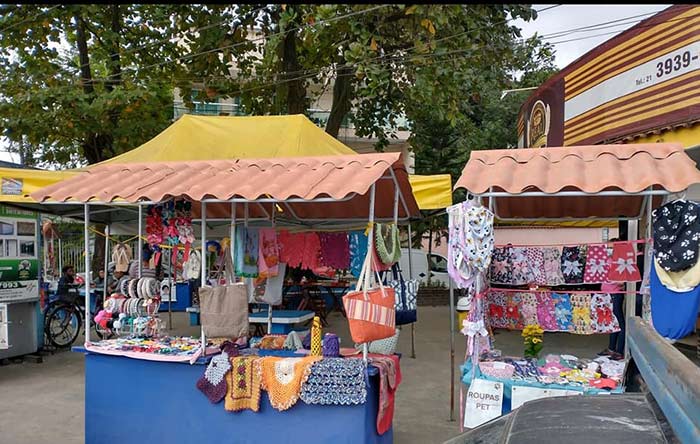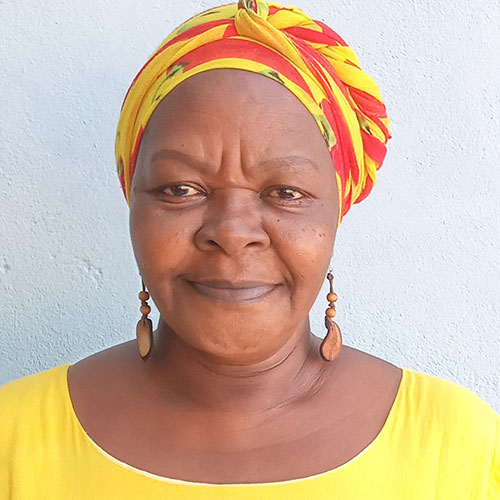Exalting the art of Rio: The Artisan Fair strengthens small entrepreneurs in Rio de Janeiro
The artisan fair is an exhibition of handicrafts produced by a group of women living in the Jardim Primavera neighborhood in Rio. Discover the project!


In general, fairs are set up so that the marketer sells his goods, makes a profit; buys more goods, sells again, and so on. But Feira do Artesão ( The Artisan Fair) is different, it goes beyond marketing. It promotes an open-air cultural exhibition and encourages the growth of a collective of artisans, making them see themselves as artists and cultural producers.
The Artisan Fair was founded in 2019 and takes place on Thursdays in Jardim Primavera, Duque de Caxias, Rio de Janeiro.
Patrícia Alves Sudré, a resident of the neighbourhood, is the creator and coordinator of Feira do Artesão (The Artisan Fair). A visual artist, she has an art and painting project called “Território Arte Ateliê”, through which she promotes art shows to help other artists. Patrícia Sudré tells us, in this interview, how the fair works.
Neuza Nascimento: What is The Artisan Fair and what is its purpose?
Patrícia Sudré: Feira do Artesão (The Artisan Fair) is an exhibition of handicrafts produced by a collective of women living in the Jardim Primavera neighbourhood every Thursday, unless there is a setback, such as rain, for example. The purpose is to strengthen the collective while also assisting and encouraging the participating artisans to develop and have a cultural perspective on their work rather than viewing it solely as a product to be sold.
Neuza Nascimento: Does the event only take place in Jardim Primavera?
Patrícia Sudré: It is not necessarily fixed in Jardim Primavera, although it is our base there. The fair is itinerant, it only depends on invitations and the space given to us.
Neuza Nascimento: How many exhibitors participate in the fair?
Patrícia Sudré: There are 23 registered residents. We started with that number because it was the number of tents that were given to us, and we decided to keep them. We have the objective of promoting people as cultural producers, but if there are a lot of people, it becomes more difficult.
Neuza Nascimento: Is there a team?
Patricia Sudré: Not yet. We’re still riding. We’re now that many have left due to the pandemic and others have arrived. As we get to know each other, we fit each one according to competence, so that we can institutionalise ourselves. For the time being, I am the coordinator
Neuza Nascimento: How is the fair maintained?
Patrícia Sudré: The tents are loaned by the city of Duque de Caxias, and we have a licence to work in the space where we are working. We were covered by the edict of the Aldir Blanc Law, enacted on June 29, 2020, of an emergency nature due to the economic and social effects caused by the Covid-19 pandemic, and we still have a little bit of resources from this subsidy. With it, we pay for transportation and assembly of tents and each artisan contributes R$10.00 to each fair. And so, we have remained.
Neuza Nascimento: How is the relationship between the neighbourhood and the fair?
Patrícia Sudré: Neighbourhood entrepreneurship is difficult. We must make people understand what a handicraft fair is and that they see and consume it as culture, because handicraft is culture. We must work on it little by little, talking and inviting people to honour us every week, but this builds up over time. We have the support of the owner of the bakery next to the fair who lets us use the bathroom, this can be considered a very important involvement, as we have many ladies as exhibitors.
Neuza Nascimento: What are the biggest challenges in setting up and coordinating a fair like this?
Patrícia Sudré: Getting artisans to understand that they can do more than produce and sell. There are limiting beliefs and developmental difficulties, but everything happens in its own time, it can’t be forced. The identity of each one must be respected; the information must be inserted little by little and they are absorbed according to the time of each one. They must recognise the cultural value of each piece produced, recognise that they can progress along this path, and truly see themselves as cultural producers, as artists. Finally, the biggest challenge is to make the artisan understand that he cannot participate in competitions just for the money, that is not the idea. The idea is that each bid won, each project approved, improves the personal and professional life of each one and that they emerge from these experiences more capable and independent. If the artisan designs a project thinking only about the money, he will end up mixing the enterprise’s expenses with the personal ones, and it can be complicated at the moment of rendering the accounts.
Neuza Nascimento: Any victories to report?
Patricia Sudré: My children. But speaking of the fair, the victories were many. We obtained our vectorized logo (an image that can be expanded indefinitely, without losing definition quality) through a public notice from LABIC (Laboratory of Studies on Image and Cyberculture) of UFRJ (Federal University of Rio de Janeiro) to which we sent a project called “A Feira do Artesão na Era Digital” (The Artisan Fair in the Digital Age). LABIC is an initiative that supports projects that struggle to understand where they can go, what they need to look for, and what they need to study. With their guidance, we were able to understand how the fair can grow through the preparation and submission of projects, we left our territory to visit other places and make a growth map, which we intend to resume soon, as it was paralysed due to the pandemic. Another victory was getting second place in the “1st Prêmio Vozes da Mobilidade”, from Jornal Estadão de São Paulo, 2021, in the category “Inclusion and Opportunity in the Labour Market” and our participation in the Aldir Blanc Law notice, which was very important to us.
Neuza Nascimento: Is the fair formalised?
Patrícia Sudré: No, but we are heading towards that. We still don’t know if it will be a cooperative, association or NGO. We’re talking about it, deciding what’s best for everyone. It is necessary that we all agree to reach the best decision, and also for the collective to get involved and feel part of it.
Neuza Nascimento: How frequent was the fair during the Pandemic, and how frequent is it now?
Patrícia Sudré: We had to stop temporarily because of the pandemic, as many have not yet been able to return for personal or health reasons. But we cannot fill the vacancies of these people because they are not attending, because many of them depend on the fair for sustenance, we must wait. These women cannot simply be disconnected from the project, unless they manifest this desire or commit a serious infraction. We should soon return to normal activities, following safety standards, and most participants have already been vaccinated.
Neuza Nascimento: Any future actions?
Patrícia Sudré: Yes, the fair will support artisans in the registration of the public notice “Cultura Presente as Redes 2”, as well as helping in the organisation of the workshops that will be proposed, if they are contemplated If the edict is approved, it will provide another source of income in these difficult times, with little revenue and profit return.
Neuza Nascimento: Is there any need at the fair with which a reader of this interview could assist?
Patrícia Sudré: Our greatest need in the short and medium term is financial resources to pay for the fair’s expenses, including transportation, assembly, and maintenance of the tents, with the goal of eliminating the expenses of the exhibitors, who are experiencing a very difficult time in their lives in general. We also need food donations and hygiene and cleaning materials to compose Basic Baskets and pass them on to exhibitors who are not able to participate, as I said earlier, many have as their only source of income what they collect at the fair. On the other hand, sales dropped drastically, and this has greatly discouraged exhibitors from continuing. We also want to make changes to the tents, which are made of iron and have a plastic roof, which weighs a lot. If we manage to make this exchange, it will be much lighter and less of an expense, so we can assemble it ourselves, leaving only the expense of transport and maintenance.
These are small things, but they are solutions that can improve and make life easier for all exhibitors.
Neuza Nascimento: Any future dreams?
Patrícia Sudré: I would love to institutionalise the artisan fair so that all participants can benefit from qualification notices, fundraising, and other advantages that come with formalisation. My wish is that they become cultural producers, being able to give classes and craft workshops and, with that, having other sources of income other than through the fair. With the benefits of institutional support, they will have room to change their view of their craft productions and will be able to see more clearly the cultural value of these works. With all of these dynamics, artisans will be able to grow and see how far they can take their craft. All these are dreams and plans, we still have to assemble the right team. Everything is moving very slowly, due to the limitations of the pandemic.
Did you like this initiative?
To support Feira do Artesão (The Artisan Fair), contact: +55 (21) 98747-9650
Also visit the Artisan Fair website, Facebook and Instagram.



